The eleventh annual Panorama Europe showcases European works that have won acclaim at festivals and represent the continent’s diversity of art-house cinema. For more than two weeks, the program showcases 17 recent features. Perhaps fitting for a political union coping with Brexit and a migrant influx, two films in particular focus on a slow-burn struggle for a place in the world, with protagonists returning to an identity they left behind and may want to reject.
Return to Bollène
Saïd Hamich’s directorial debut shines a light on the travails of France’s Maghreb community seen through the angry eyes of Nassim (Anas El Baz), a successful businessman now relocated to Abu Dhabi who makes a reluctant trip home with his American fiancée. Welcome to Trump country a la française—the camera coolly and distantly drifts by a forgotten place fallen on hard times, ironically underscored by a chirpy billboard campaign promoting the town’s unity.
Nassim finds a family conforming to France’s absolute worst images of Arab immigrants. Doing poorly in school, his vivacious sister finds refuge in what looks like an ill-advised arranged marriage. His brother makes ends meet by dealing drugs. Family members self-righteously carp at Nassim’s drinking a glass of wine. And an old grievance hangs over the household, which is unable to let go of a festering grudge.
The returnee handles this grim situation first with subtle digs, then with open rage. He curses his family and confronts an old schoolteacher who now dabbles in right-wing politics. In an act that echoes a negative stereotype of Arab men, he lays into his girlfriend with a verbal sally of astonishing cruelty, mostly for the crime of being American.
Nassim’s motives fall into place gradually and provide an uneasy partial resolution to the many, many conflicts he faces. But Return to Bollène offers a glimpse of a character who responds to a tough situation by creating his own private hell, perhaps a metaphor for nations turned in on (and against) themselves.
Fugue
Polish auteur Agnieszka Smoczynska’s icy, deadpan Fugue delivers a surreal wrench on the classic amnesia story, with Eastern European fatalism and a skewed feminist perspective further twisting the tale. A disheveled woman (Gabriela Muskala, also the film’s screenwriter) enters the picture emerging from a railroad tunnel. She then kneels to pee on a platform in full view of a scandalized crowd desperately trying to pretend it doesn’t see what she’s doing. This act of provocation sprays the territory for an unpredictable and quietly furious exploration of identity: Who is this woman?
Turns out she is a lost soul who doesn’t remember her name or origins. A bizarre talk-show appearance reunites the woman—her name is actually Kinga—with her family, with whom she shares possibly the most uncomfortable meal since the dinner scene in 4 Months, 3 Days and 2 Weeks. Kinga’s herky-jerky attempts to reconnect with her husband and particularly her young son will dominate the rest of the film, but the task will not be easy. Her tendency to walk about bare-bottomed in the house doesn’t exactly help matters along.
It takes brass for a filmmaker to create a woman character so defiantly detached and abrasive, and the amnesia angle and several fanciful magic realist interludes make the movie an intriguing if uncomfortable experience. Long, cool takes, in shades of pewter and silver, overlay an unsettling atmosphere with smooth assurance. Again, maybe it’s an allegory for the way we conceal gnarled questions under a placid surface, in Europe and all over the world.
The Panorama Europe Film Festival runs until May 19 at the Museum of the Moving Image in Queens, NY



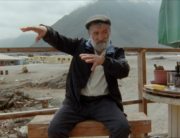
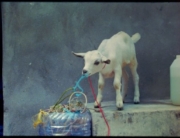
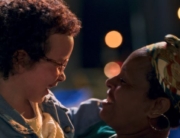
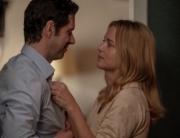
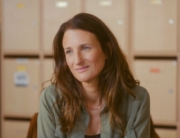
Leave A Comment